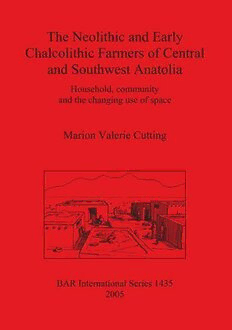
The Neolithic and Early Chalcolithic Farmers of Central and Southwest Anatolia: Household, community and the changing use of space PDF
183 Pages·2005·8.56 MB·English
Most books are stored in the elastic cloud where traffic is expensive. For this reason, we have a limit on daily download.
Preview The Neolithic and Early Chalcolithic Farmers of Central and Southwest Anatolia: Household, community and the changing use of space
Description:
This research presents the qualitative and quantitative data collected from the architecture within ten Neolithic and Early Chalcolithic settlements in the Central and Southwestern regions of modern-day Anatolia, the larger part of Turkey lying on the 'Asian side' to the east of Istanbul. The sites investigated are: Aþýklý Höyük, Çatalhöyük, Canhasan III, Canhasan I, Güvercinkayasý, Höyücek, Bademaðacý, Erbaba, Hacýlar and Kuruçay. After investigating the interplay between theory and methodology in order to establish a research methodology, the work offers a general overview of the topography and climate of Central and Southwest Anatolia, reviews the current state of archaeological knowledge about prehistoric subsistence and settlement patterns and explains the selection of the ten sites for further study. The qualitative and quantitative data for these ten sites are then presented and analysed and the concluding chapter considers to what extent the research has been able to contribute to current theories about household and community within the Near East. It makes some general observations about the relationship between individual households and the wider community over region, subsistence patterns and time, sets the research within the wider field of settlement studies and identifies the need for further research.
See more
The list of books you might like
Most books are stored in the elastic cloud where traffic is expensive. For this reason, we have a limit on daily download.
